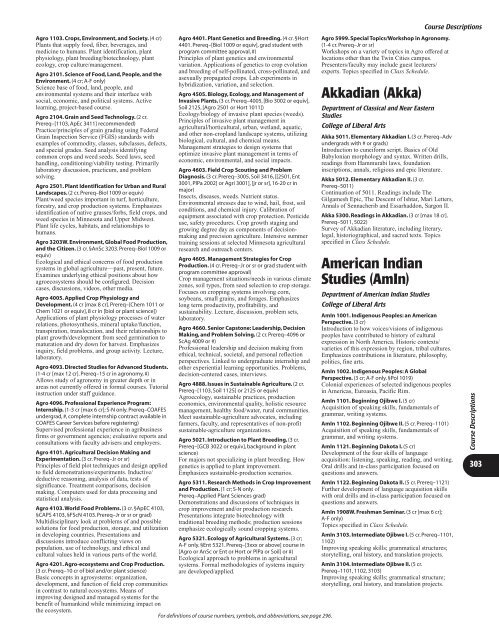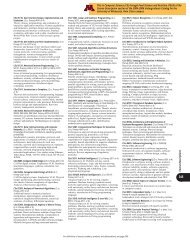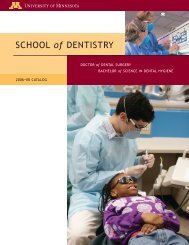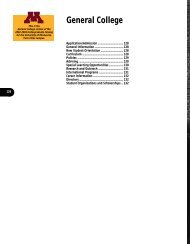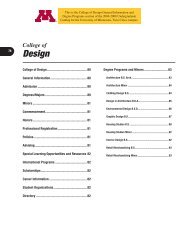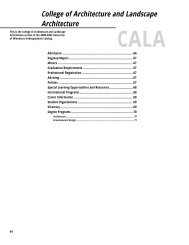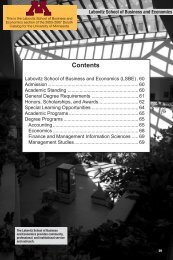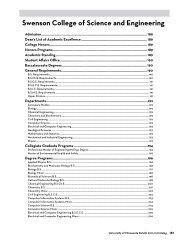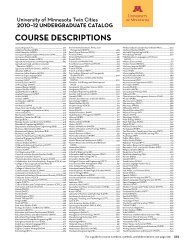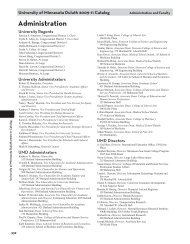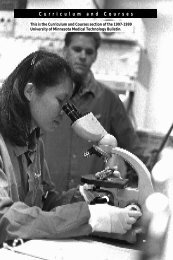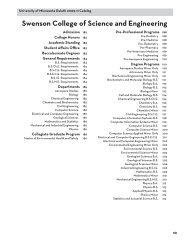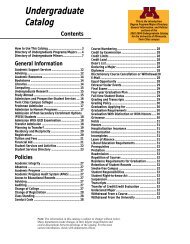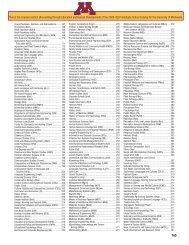CoursesâA through G and course numbers and symbols key
CoursesâA through G and course numbers and symbols key
CoursesâA through G and course numbers and symbols key
- No tags were found...
You also want an ePaper? Increase the reach of your titles
YUMPU automatically turns print PDFs into web optimized ePapers that Google loves.
Agro 1103. Crops, Environment, <strong>and</strong> Society. (4 cr)Plants that supply food, fiber, beverages, <strong>and</strong>medicine to humans. Plant identification, plantphysiology, plant breeding/biotechnology, plantecology, crop culture/management.Agro 2101. Science of Food, L<strong>and</strong>, People, <strong>and</strong> theEnvironment. (4 cr; A-F only)Science base of food, l<strong>and</strong>, people, <strong>and</strong>environmental systems <strong>and</strong> their interface withsocial, economic, <strong>and</strong> political systems. Activelearning, project-based <strong>course</strong>.Agro 2104. Grain <strong>and</strong> Seed Technology. (2 cr.Prereq–[1103, ApEc 3411] recommended)Practice/principles of grain grading using FederalGrain Inspection Service (FGIS) st<strong>and</strong>ards withexamples of commodity, classes, subclasses, defects,<strong>and</strong> special grades. Seed analysis identifyingcommon crops <strong>and</strong> weed seeds. Seed laws, seedh<strong>and</strong>ling, conditioning/viability testing. Primarilylaboratory discussion, practicum, <strong>and</strong> problemsolving.Agro 2501. Plant Identification for Urban <strong>and</strong> RuralL<strong>and</strong>scapes. (2 cr. Prereq–Biol 1009 or equiv)Plant/weed species important in turf, horticulture,forestry, <strong>and</strong> crop production systems. Emphasizesidentification of native grasses/forbs, field crops, <strong>and</strong>weed species in Minnesota <strong>and</strong> Upper Midwest.Plant life cycles, habitats, <strong>and</strong> relationships tohumans.Agro 3203W. Environment, Global Food Production,<strong>and</strong> the Citizen. (3 cr. §AnSc 3203. Prereq–Biol 1009 orequiv)Ecological <strong>and</strong> ethical concerns of food productionsystems in global agriculture—past, present, future.Examines underlying ethical positions about howagroecosystems should be configured. Decisioncases, discussions, videos, other media.Agro 4005. Applied Crop Physiology <strong>and</strong>Development. (4 cr [max 8 cr]. Prereq–[Chem 1011 orChem 1021 or equiv], 8 cr in [biol or plant science])Applications of plant physiology processes of waterrelations, photosynthesis, mineral uptake/function,transpiration, translocation, <strong>and</strong> their relationships toplant growth/development from seed germination tomaturation <strong>and</strong> dry down for harvest. Emphasizesinquiry, field problems, <strong>and</strong> group activity. Lecture,laboratory.Agro 4093. Directed Studies for Advanced Students.(1-4 cr [max 12 cr]. Prereq–15 cr in agronomy, #)Allows study of agronomy in greater depth or inareas not currently offered in formal <strong>course</strong>s. Tutorialinstruction under staff guidance.Agro 4096. Professional Experience Program:Internship. (1-3 cr [max 6 cr]; S-N only. Prereq–COAFESundergrad, #, complete internship contract available inCOAFES Career Services before registering)Supervised professional experience in agribusinessfirms or government agencies; evaluative reports <strong>and</strong>consultations with faculty advisers <strong>and</strong> employers.Agro 4101. Agricultural Decision Making <strong>and</strong>Experimentation. (3 cr. Prereq–Jr or sr)Principles of field plot techniques <strong>and</strong> design appliedto field demonstrations/experiments. Inductive/deductive reasoning, analysis of data, tests ofsignificance. Treatment comparisons, decisionmaking. Computers used for data processing <strong>and</strong>statistical analysis.Agro 4103. World Food Problems. (3 cr. §ApEC 4103,§CAPS 4103, §FScN 4103. Prereq–Jr or sr or grad)Multidisciplinary look at problems of <strong>and</strong> possiblesolutions for food production, storage, <strong>and</strong> utilizationin developing countries. Presentations <strong>and</strong>discussions introduce conflicting views onpopulation, use of technology, <strong>and</strong> ethical <strong>and</strong>cultural values held in various parts of the world.Agro 4201. Agro-ecosystems <strong>and</strong> Crop Production.(3 cr. Prereq–10 cr of biol <strong>and</strong>/or plant science)Basic concepts in agrosystems: organization,development, <strong>and</strong> function of field crop communitiesin contrast to natural ecosystems. Means ofimproving designed <strong>and</strong> managed systems for thebenefit of humankind while minimizing impact onthe ecosystem.Agro 4401. Plant Genetics <strong>and</strong> Breeding. (4 cr. §Hort4401. Prereq–[Biol 1009 or equiv], grad student withprogram committee approval, #)Principles of plant genetics <strong>and</strong> environmentalvariation. Applications of genetics to crop evolution<strong>and</strong> breeding of self-pollinated, cross-pollinated, <strong>and</strong>asexually propagated crops. Lab experiments inhybridization, variation, <strong>and</strong> selection.Agro 4505. Biology, Ecology, <strong>and</strong> Management ofInvasive Plants. (3 cr. Prereq–4005, [Bio 3002 or equiv],Soil 2125, [Agro 2501 or Hort 1011])Ecology/biology of invasive plant species (weeds).Principles of invasive plant management inagricultural/horticultural, urban, wetl<strong>and</strong>, aquatic,<strong>and</strong> other non-cropl<strong>and</strong> l<strong>and</strong>scape systems, utilizingbiological, cultural, <strong>and</strong> chemical means.Management strategies to design systems thatoptimize invasive plant management in terms ofeconomic, environmental, <strong>and</strong> social impacts.Agro 4603. Field Crop Scouting <strong>and</strong> ProblemDiagnosis. (3 cr. Prereq–3005, Soil 3416, [[2501, Ent3001, PlPa 2002] or Agri 3001], [jr or sr], 16-20 cr inmajor)Insects, diseases, weeds. Nutrient status.Environmental stresses due to wind, hail, frost, soilconditions, <strong>and</strong> chemical injury. Calibration ofequipment associated with crop protection. Pesticideuse, safety procedures. Crop growth staging <strong>and</strong>growing degree day as components of decisionmaking<strong>and</strong> precision agriculture. Intensive summertraining sessions at selected Minnesota agriculturalresearch <strong>and</strong> outreach centers.Agro 4605. Management Strategies for CropProduction. (4 cr. Prereq–Jr or sr or grad student withprogram committee approval)Crop management situations/needs in various climatezones, soil types, from seed selection to crop storage.Focuses on cropping systems involving corn,soybeans, small grains, <strong>and</strong> forages. Emphasizeslong term productivity, profitability, <strong>and</strong>sustainability. Lecture, discussion, problem sets,laboratory.Agro 4660. Senior Capstone: Leadership, DecisionMaking, <strong>and</strong> Problem Solving. (2 cr. Prereq–4096 orScAg 4009 or #)Professional leadership <strong>and</strong> decision making fromethical, technical, societal, <strong>and</strong> personal reflectionperspectives. Linked to undergraduate internship <strong>and</strong>other experiential learning opportunities. Problems,decision-centered cases, interviews.Agro 4888. Issues in Sustainable Agriculture. (2 cr.Prereq–[1103, Soil 1125] or 2125 or equiv)Agroecology, sustainable practices, productioneconomics, environmental quality, holistic resourcemanagement, healthy food/water, rural communities.Meet sustainable-agriculture advocates, includingfarmers, faculty, <strong>and</strong> representatives of non-profitsustainable-agriculture organizations.Agro 5021. Introduction to Plant Breeding. (3 cr.Prereq–[GCB 3022 or equiv], background in plantscience)For majors not specializing in plant breeding. Howgenetics is applied to plant improvement.Emphasizes sustainable-production scenarios.Agro 5311. Research Methods in Crop Improvement<strong>and</strong> Production. (1 cr; S-N only.Prereq–Applied Plant Sciences grad)Demonstrations <strong>and</strong> discussions of techniques incrop improvement <strong>and</strong>/or production research.Presentations integrate biotechnology withtraditional breeding methods; production sessionsemphasize ecologically sound cropping systems.Agro 5321. Ecology of Agricultural Systems. (3 cr;A-F only. §Ent 5321. Prereq–[3xxx or above] <strong>course</strong> in[Agro or AnSc or Ent or Hort or PlPa or Soil] or #)Ecological approach to problems in agriculturalsystems. Formal methodologies of systems inquiryare developed/applied.For definitions of <strong>course</strong> <strong>numbers</strong>, <strong>symbols</strong>, <strong>and</strong> abbreviations, see page 296.Agro 5999. Special Topics/Workshop in Agronomy.(1-4 cr. Prereq–Jr or sr)Workshops on a variety of topics in Agro offered atlocations other than the Twin Cities campus.Presenters/faculty may include guest lecturers/experts. Topics specified in Class Schedule.Akkadian (Akka)Course DescriptionsDepartment of Classical <strong>and</strong> Near EasternStudiesCollege of Liberal ArtsAkka 5011. Elementary Akkadian I. (3 cr. Prereq–Advundergrads with # or grads)Introduction to cuneiform script. Basics of OldBabylonian morphology <strong>and</strong> syntax. Written drills,readings from Hammurabi laws, foundationinscriptions, annals, religious <strong>and</strong> epic literature.Akka 5012. Elementary Akkadian II. (3 cr.Prereq–5011)Continuation of 5011. Readings include TheGilgamesh Epic, The Descent of Ishtar, Mari Letters,Annals of Sennacherib <strong>and</strong> Essarhaddon, Sargon II.Akka 5300. Readings in Akkadian. (3 cr [max 18 cr].Prereq–5011, 5022)Survey of Akkadian literature, including literary,legal, historiographical, <strong>and</strong> sacred texts. Topicsspecified in Class Schedule.American IndianStudies (AmIn)Department of American Indian StudiesCollege of Liberal ArtsAmIn 1001. Indigenous Peoples: an AmericanPerspective. (3 cr)Introduction to how voices/visions of indigenouspeoples have contributed to history of culturalexpression in North America. Historic contexts/varieties of this expression by region, tribal cultures.Emphasizes contributions in literature, philosophy,politics, fine arts.AmIn 1002. Indigenous Peoples: A GlobalPerspective. (3 cr; A-F only. §Pol 1019)Colonial experiences of selected indigenous peoplesin Americas, Euroasia, Pacific Rim.AmIn 1101. Beginning Ojibwe I. (5 cr)Acquisition of speaking skills, fundamentals ofgrammar, writing systems.AmIn 1102. Beginning Ojibwe II. (5 cr. Prereq–1101)Acquisition of speaking skills, fundamentals ofgrammar, <strong>and</strong> writing systems.AmIn 1121. Beginning Dakota I. (5 cr)Development of the four skills of languageacquisition: listening, speaking, reading, <strong>and</strong> writing.Oral drills <strong>and</strong> in-class participation focused onquestions <strong>and</strong> answers.AmIn 1122. Beginning Dakota II. (5 cr. Prereq–1121)Further development of language acquisition skillswith oral drills <strong>and</strong> in-class participation focused onquestions <strong>and</strong> answers.AmIn 1908W. Freshman Seminar. (3 cr [max 6 cr];A-F only)Topics specified in Class Schedule.AmIn 3103. Intermediate Ojibwe I. (5 cr. Prereq–1101,1102)Improving speaking skills; grammatical structures;storytelling, oral history, <strong>and</strong> translation projects.AmIn 3104. Intermediate Ojibwe II. (5 cr.Prereq–1101, 1102, 3103)Improving speaking skills; grammatical structure;storytelling, oral history, <strong>and</strong> translation projects.Course Descriptions303


